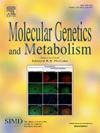多西汀和多西布替明治疗胸苷激酶2缺乏症1例
IF 3.5
2区 生物学
Q2 ENDOCRINOLOGY & METABOLISM
引用次数: 0
摘要
胸苷激酶2 (TK2)缺乏症是一种罕见的线粒体缺失综合征,其特征是负责编码线粒体胸苷激酶2酶的核TK2基因突变。TK2的作用是磷酸化线粒体DNA (mtDNA)复制所需的脱氧胞苷(dC)和脱氧胸腺嘧啶(dT)核苷;因此,缺乏TK2酶会导致mtDNA复制功能失调。TK2缺乏症在儿童中表现为进行性肌肉无力、呼吸困难和mtDNA缺失。医学文献中描述的患者不到120例,目前还没有fda批准的治疗TK2缺乏症的方法。提供外源性脱氧核苷(dC/dT)允许通过胞质酶胸苷激酶1 (TK1)和脱氧胞苷激酶(dCK)以及任何残留的TK2活性进行mtDNA的复制。在这里,我们描述了一位26岁的女性,她患有儿童期发病的TK2缺乏症,其特征是进行性肌病、疲劳、体重减轻、萎缩、骨折、吞咽困难、神经病变和呼吸衰竭。随着脱氧核苷治疗和多种治疗方式(物理、职业和语言)的开始,她的下降速度减慢,并显示出稳定的改善。本文章由计算机程序翻译,如有差异,请以英文原文为准。
Doxecitine and doxribtimine treatment in an adult patient with thymidine kinase 2 deficiency
Thymidine kinase 2 (TK2) deficiency is an ultrarare mitochondrial depletion and deletion syndrome characterized by mutations in the nuclear TK2 gene responsible for encoding the mitochondrial thymidine kinase 2 enzyme. TK2's role is to phosphorylate the nucleosides deoxycytidine (dC) and deoxythymidine (dT) required for mitochondrial DNA (mtDNA) replication; therefore, deficient TK2 enzymes result in dysfunctional replication of mtDNA. TK2 deficiency presents in children as progressive muscle weakness, respiratory difficulty, and mtDNA depletion. Fewer than 120 patients have been described in medical literature, and there are currently no FDA-approved treatments for TK2 deficiency. Provision of exogenous deoxynucleosides (dC/dT) allow for replication of mtDNA via cytosolic enzymes thymidine kinase 1 (TK1) and deoxycytidine kinase (dCK), as well as any residual TK2 activity. Here we describe a 26-year-old female with childhood-onset TK2 deficiency characterized by progressive myopathy, fatigue, weight loss, atrophy, bone fractures, dysphagia, neuropathy, and respiratory failure. With initiation of deoxynucleoside therapy and multiple therapy modalities (physical, occupational, and speech), her rate of decline slowed and she has shown steady improvement.
求助全文
通过发布文献求助,成功后即可免费获取论文全文。
去求助
来源期刊

Molecular genetics and metabolism
生物-生化与分子生物学
CiteScore
5.90
自引率
7.90%
发文量
621
审稿时长
34 days
期刊介绍:
Molecular Genetics and Metabolism contributes to the understanding of the metabolic and molecular basis of disease. This peer reviewed journal publishes articles describing investigations that use the tools of biochemical genetics and molecular genetics for studies of normal and disease states in humans and animal models.
 求助内容:
求助内容: 应助结果提醒方式:
应助结果提醒方式:


